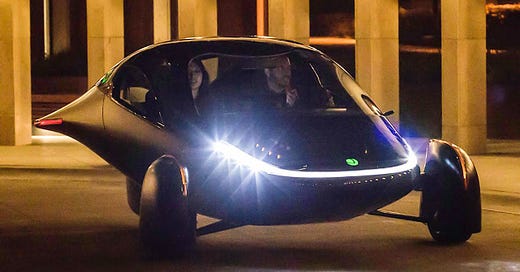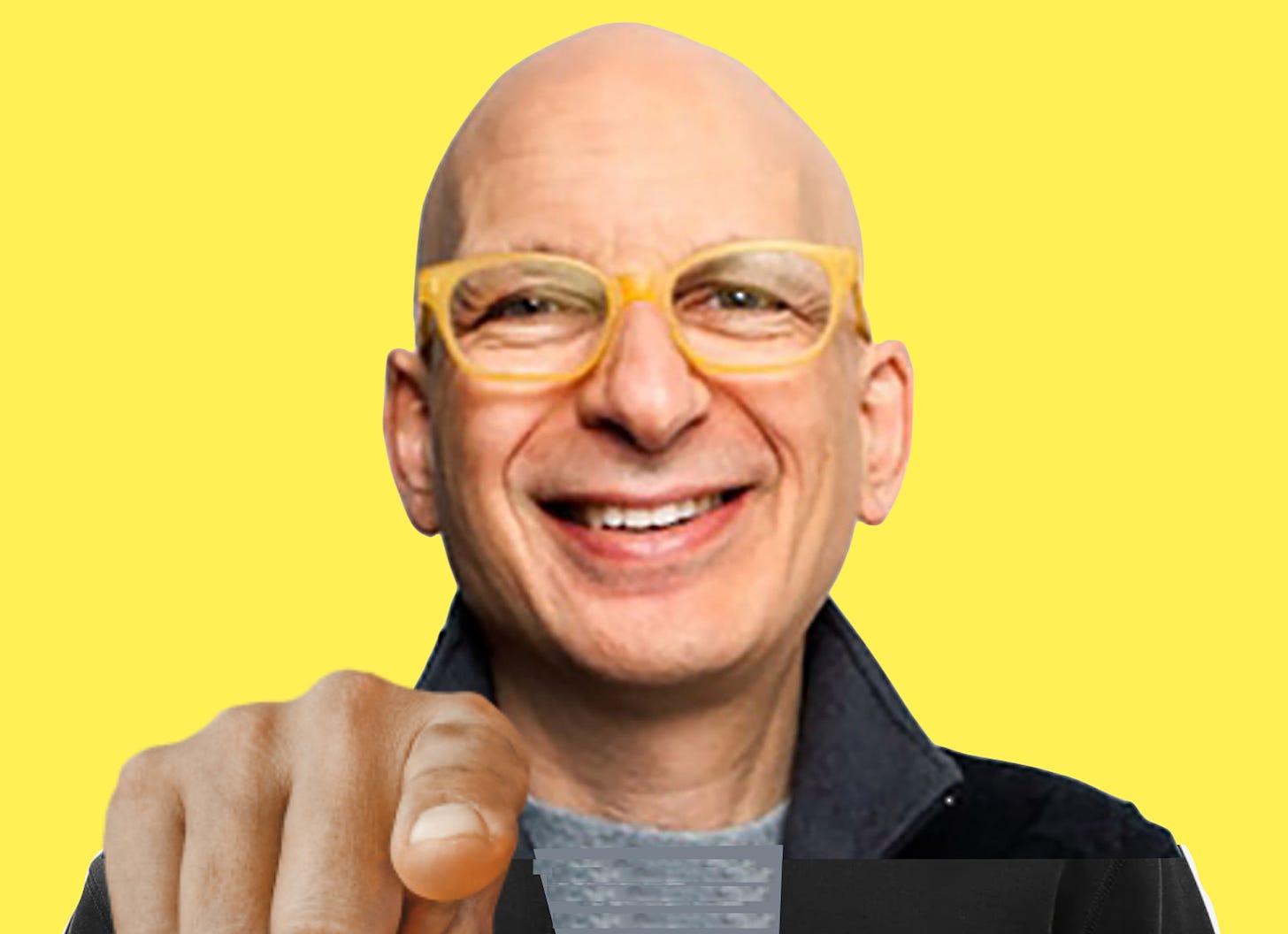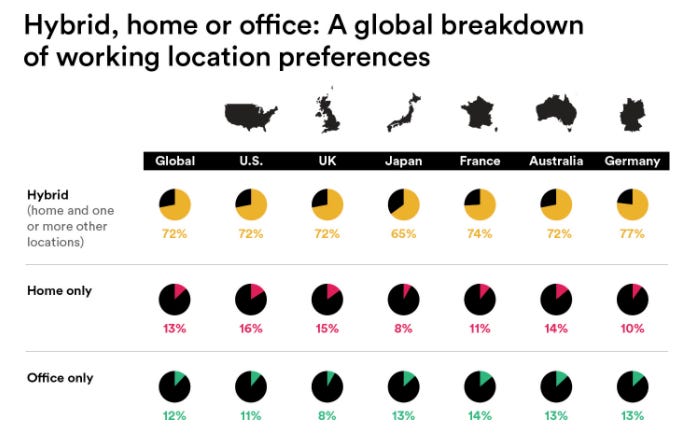What we get wrong about predictions
ALSO: Seth Godin on creativity / 'productivity obsession peaks in recessions'
I spend a lot of my time reading about climate change (and, candidly, wondering if there’s a gap in the debate to bring the Sunrise Movement to the UK).
And as a result I was really struck by the new Paradigm car launch this week. Paradigm is a weird looking electric car that never needs charging up. The whole outside is covered in solar guzzling power cells. While it has a range of 1000 miles on a full charge, by just leaving it in the street it will let you drive 40 miles per day - enough for most people in their day-to-day usage. The creators say that because of that it has a feeling of infinite free power.
The car itself is Jetson-esque fugly and additionally a lot of commentary has suggested that the only places with enough sun to generate 40 miles a day are places close to the tropical edges of the temperate climatic zone, like Spain or Southern California. But when I saw it I was immediately reminded of how I reacted when someone first showed me WAP on their Ericsson candybar phone.
I was standing outside a pub in Farringdon discussing what bar a few us should head on to when someone leaned over and proudly performed a venue search on their 2.0 inch LCD screen. He tapped in a query (using the old numeric keypads that required four patient pushes just to get an S, this alone probably took up a minute) and we stood and waited. It was at least 40 seconds before information started to gradually appear. The gathered rubberneckers soon lost interest, and like me, dismissed WAP as one for obsessives. Who needs that?
Like WAP, the worst thing we can do with the Paradigm car is regard it as the final stage and write it off. I remember vividly that leery experts would often mock solar and wind power, scoffing at the delusional fantasists who dreamed of it replacing our fossil fuel energy use. Fools, the lot of them. If only I’d remembered their names. In 2020 the predictions for the cost of solar power are up to 50% lower than we predicted just two years ago. Solar power is already being declared the cheapest power in history. As investment goes into solar it is becoming ever cheaper, exponentially so. The same with wind power. The idea that energy could end up being effectively so cheap as to be something you merely subscribe to is no longer the stuff of science fiction.
So it is with the Paradigm car, and so it is with all technological advances. We shrug off any first step as being merely incremental. The Paradigm looks homemade and I don’t live in a warm country. We decide that we’re in the ‘dismiss’ column and move on.
Now let’s think of the implication of that with work and how we’re working. Most surveys suggest that there is agreement that the way we’re likely to work in 2021 and beyond will evolve from how we entered 2020. The consensus is that most firms will offer a hybrid model of one or two days working at home per week. That’s the Farringdon WAP demo. The Paradigm v1 of work is two days a week at home.
So what’s the blazing fast internet on your phone version of that? All of the people who are currently saying ‘my firm will never have people working from wherever they want’ are of course, merely doing what I was doing (or what the solar power naysayers were doing). They were looking at change and based on the first babystep projecting a determination that most things will stay the same. Things do stay broadly the same in most years, it’s a helpful heuristic. But things aren’t going to stay the same with work.
But who wins here? Do the firms that move slowly win? The ones who battle to get people back to the office full-time till they can’t sustain the worker revolt, or until recessionary cuts mean they need to downscale? Or are the winners the firms who say ‘let’s get ahead of this? Let’s intentionally create something different’, something better.
To my mind when we aren’t together regularly we do lose a substantial benefit of human connection. There is vast volumes of research that says that humans are happier and healthier when they are in frequent face-to-face contact with others. At the moment we’re losing some of the best parts of workplace culture without thinking of how we’ll recreate them. Just saying ‘we’ll do it the old way’ isn’t a long-term solution.
The companies who set out in 2021 to build incredible cultures in new ways will have a headstart on the rest of us. Don’t make the mistake of looking at the first step as the final destination, there’s more change coming, get ready for it.
Seth Godin’s secret: how to make YOU more creative
Seth Godin is always worth listening to (here I chatted to him about how anyone could set about changing their workplace culture). I had a discussion with him this week about creativity. He feels passionately that we need rethink it.
And the good news is that everyone can be more creative. He was so dogged by his need to share this that he has turned it into a book, The Practice. In the podcast we talk about the simple way to unlock creativity and ask why schools don't teach this. At the end Seth gives his recommendations of the best things you should be reading (also linked in the show notes).
Listen: Apple / Spotify / internet
Gitlab’s course ‘How to manage a remote team’ (which is free on Coursera) might be the best 11 hours you spend to prepare for 2021
“Productivity obsessions have historically correlated with precarious job markets, extended recessions, and overarching instability”
“The contrarian in me right now is fairly optimistic… I’ve been working for 30 years, it’s only this year I’ve realised how much time I’ve been wasting… I’d spent two hours every day, not being paid for it and not being productive… This year has taught us we don’t have to commute every day”. 50 minutes into this podcast interview with the Chief Economist of the Bank of England he talks about the awakening of 2020 (thank you for Steve McIntosh for sharing this)
Slack’s future of remote working report has some data to share with your boss
This is the last newsletter before the new year. I hope you all have a wonderful festive period. Because of Covid it’s the first year in a while that I’m not working on Christmas Day and I’m sad to miss it. Fingers crossed normal life is back long before next Christmas.
Make Work Better is created by Bruce Daisley, workplace culture enthusiast. You can find more about Bruce’s book, podcast and writing at the Eat Sleep Work Repeat website. If you’re looking to facilitate a leadership discussion about work culture - or just a lunchtime talk to the team, get in touch!








